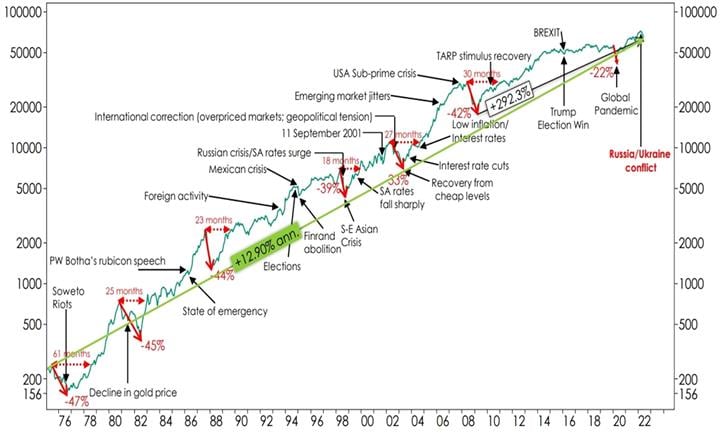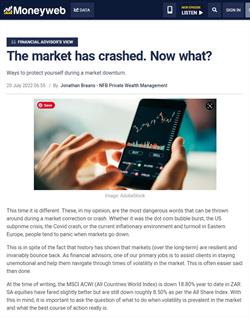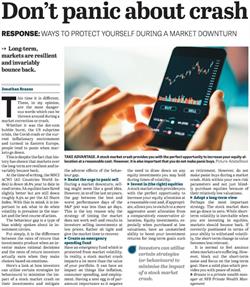The market has crashed. Now what?
Why you need to sit tight and let the market recover.


This time it is different. These, in my opinion, are the most dangerous words that can be thrown around during a market correction or crash. Whether it was the dot com bubble burst, the USA subprime crisis, the COVID crash, or the current inflationary environment and turmoil in Eastern Europe, people tend to panic when markets go down. This in spite of the fact that history has shown that markets (over the long-term) are resilient and invariably bounce back. As financial advisors, one of our primary jobs is to assist clients in staying unemotional and help them navigate through times of volatility in the market. This is often easier said than done. At the time of writing, the MSCI ACWI (All Countries World Index) is down 18.80% year to date in ZAR. SA Equities have fared slightly better but are still down roughly 8.50% as per the All Share Index. With this in mind, it is important to ask the question of what to do when volatility is prevalent in the market and what the best course of action really is.
Invariably, when markets are down, nobody is happy. Clients, fund managers and financial advisors all want to see markets running and growth in clients’ investments. However, this is simply not how markets work. One of my favourite quotes on market volatility comes from Charlie Munger, the Vice Chairman of Berkshire Hathaway and Warren Buffett’s right-hand man: "If you can't stomach 50% declines in your investment, you will get the mediocre returns you deserve." Corrections and crashes are fundamental components of any healthy market.
The below chart from Old Mutual provides a very accurate depiction of market behaviour and volatility.

Source: Old Mutual Investment Group I-Net, | Updated 09.05.2022 | Date ending 30.04. 2022 | FTSE/JSE All Share Price Index
What can we learn from this? First, that the stock market is naturally cyclical, with major falls of around 20% to 50% every 8 to 10 years on average. However, despite these crashes, the market has still produced returns of 12.90% on an annualised basis. This means if you invested R1 000 in 1976, you would have R265 412 today. However, it is important to go one step further and look at the real return the market has provided since 1976 (i.e. over and above inflation). Average inflation in South Africa over the last 46 years has sat at around 8.70%. This means that R1 000 in 1976 would be the equivalent of only R46 737 today. This shows how the market over the last 46 years has substantially outpaced the rate of inflation.
The behaviour gap is a type of behavioural bias that is widely spoken about in investment circles. Put simply, it is the difference between the rates of return that investments produce when an investor makes rational decisions and the rates of return investors actually earn when they make choices based on emotions. Now that we’ve seen evidence of the resilience of markets, we should look at how investors can utilise certain strategies (or behaviours) in order to minimise the impact of a stock market crash on their investments and mitigate the adverse effects of the behaviour gap.
1. Resist the urge to panic sell
During a market downturn, selling your investments might seem like a good idea. However, historical data shows us that in 10 of the last 20 years, the gap between the best and worst performance days of the S & P 500 was less than 40 days. This is the key reason why the strategy of timing the market does not work well and results in investors selling their investments at low prices. Rather sit tight and give the market time to recover.
2. Create an emergency spending fund
A great way to protect yourself from the effects of a market crash is to ensure you have an emergency fund that is protected from market volatility. In reality, a stock market crash impacts a lot more than the value of your portfolio. It can have an impact on things like inflation, consumer spending, and employment. Having a ‘nest egg’ that you can use for emergency spending needs as they arise is therefore of paramount importance as it negates the need to drawdown on any equity investments you may hold during times of volatility.
3. Invest in (the right) equities
A stock market crash provides you the perfect opportunity to increase your equity allocation at a reasonable cost and, if appropriate, allows you to switch to a more aggressive asset allocation from a comparatively conservative allocation. This is because equity investments, especially when purchased at low valuations, have an unmatched ability to boost your investment returns for long-term goals such as retirement. However, just as point 1 above warns against panic selling, it is also important that you do not make panic buys during a market crash. Remember to stick within your own risk parameters and not just blindly purchase equities because of their relatively low valuations.
4. Adopt a long-term view
Perhaps the most important strategy on this list. The stock market does not go down to zero. While short-term volatility is inevitable when you are investing in equities, markets should bounce back and discover new all-time highs. If correctly positioned in terms of your ability to withstand volatility, the short term change in value becomes less relevant.
It is perfectly normal to feel anxious or nervous when markets are suffering. However, it is imperative that you block out the short-term noise and focus on the long-term goal. A stock market crash provides an opportunity to grow your wealth. Get in touch with an advisor and make sure you have a solid long-term plan in place that provides you with peace of mind even when markets are volatile.
| This article was published on Moneyweb's Financial Advisor's View, as well as printed on page 27 in the Saturday Citizen on 23 July 2022. |
|
 |
 |













